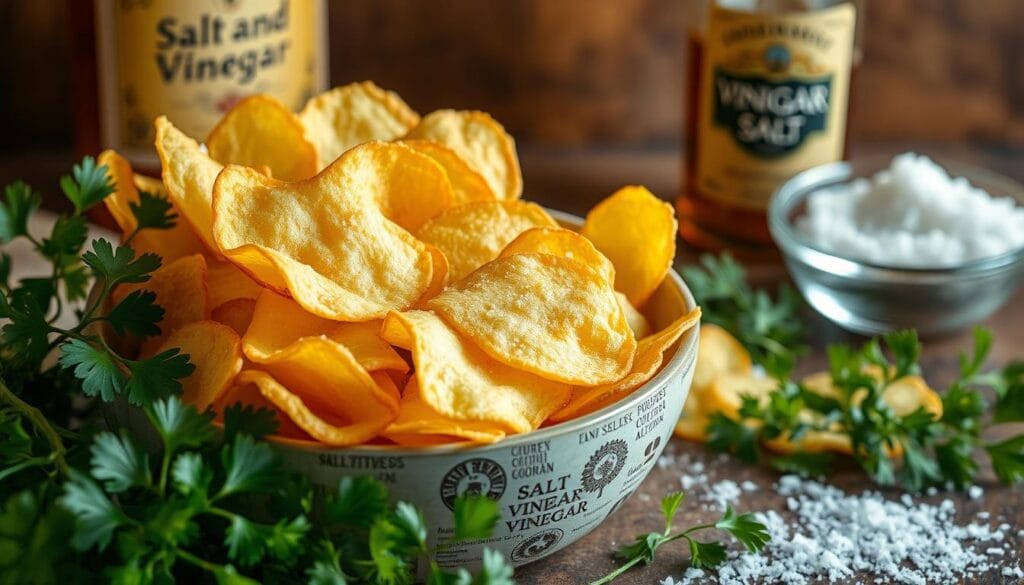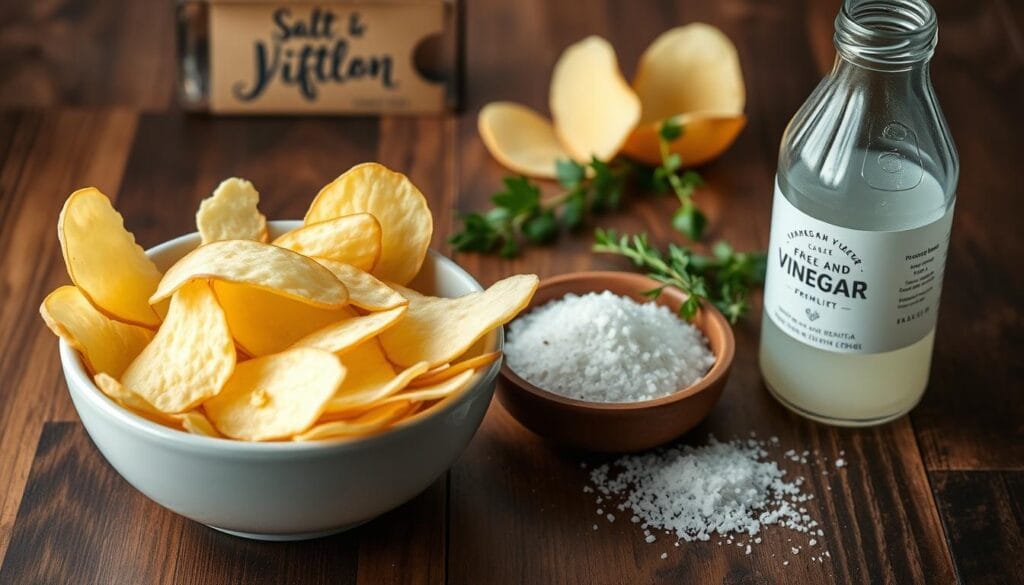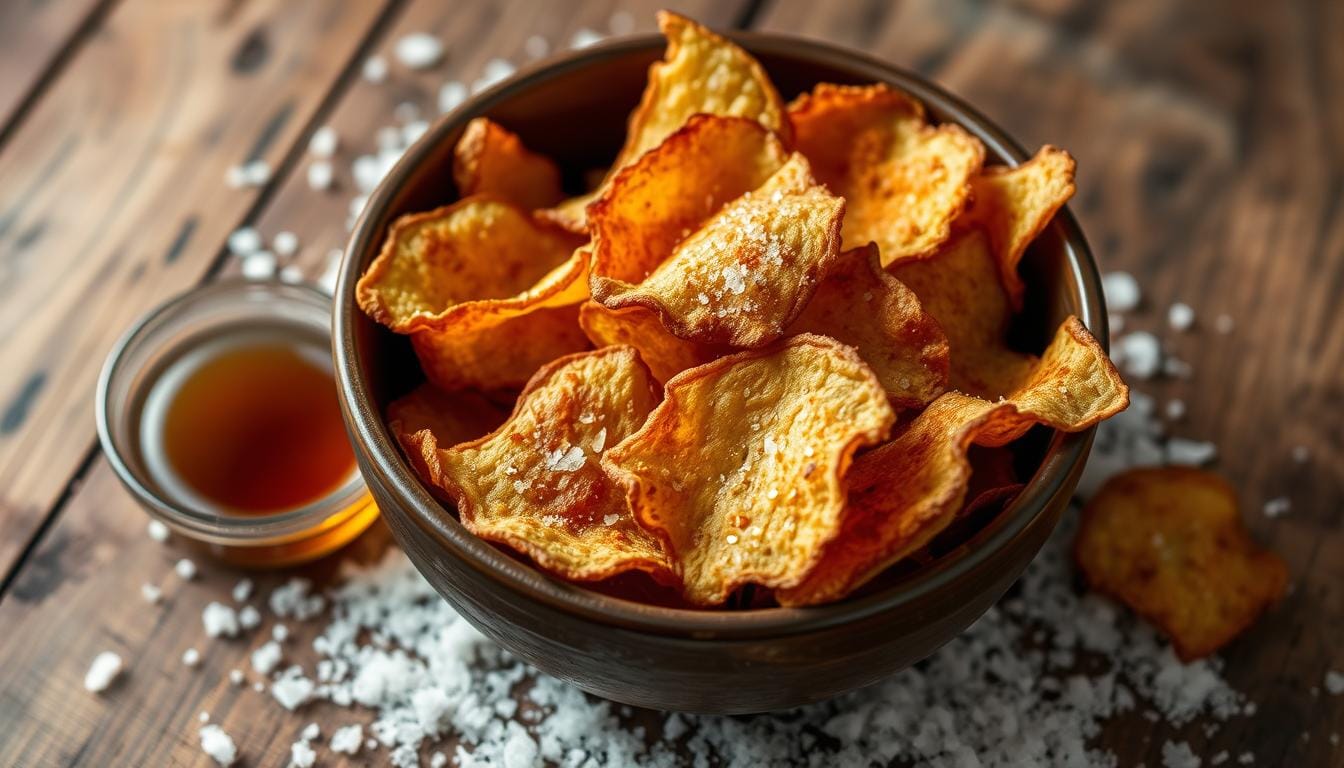Every time I opened a bag of store-bought salt and vinegar chips, I knew something was missing. The flavor never quite hit that perfect tangy punch I craved. That’s when I discovered the magic of creating homemade crispy snacks right in my own kitchen.
Making salt and vinegar chips at home isn’t just a cooking project—it’s a culinary adventure. It transforms simple ingredients into an incredible snack experience. You’ll find out how easy it is to make chips that are far more delicious than store-bought ones.
Whether you’re a snack enthusiast or a home cooking adventurer, this guide will show you how to make the most mouthwatering homemade chips. Get ready to revolutionize your chip-making skills. Impress your friends and family with restaurant-quality salt and vinegar chips.
Key Takeaways
- Homemade chips offer superior flavor and freshness
- Creating salt and vinegar chips is easier than you think
- Control ingredients and customize taste to your preference
- Save money compared to purchasing premium packaged chips
- Enjoy a fun cooking experience with delicious results
Understanding the Appeal of Salt and Vinegar Chips
Salty potato chips with a tangy twist have won over snack lovers everywhere. The mix of sharp vinegar and salt makes them irresistible. These vinegar flavored chips offer a unique snacking experience.

The world of tangy chips is full of history and innovation. Let’s explore what makes these snacks so appealing.
The History of This Classic Flavor Combination
Salt and vinegar chips started as a new snack in the late 20th century. They come from European traditions where vinegar was used for flavor and preservation.
- 1950s: First commercial salt and vinegar chips appeared
- 1980s: Widespread popularity in North America
- Today: Global snack phenomenon
Why Homemade Versions Taste Better
Making your own salty potato chips lets you control the flavor. Homemade chips have many benefits:
- Fresh ingredients
- Customizable vinegar intensity
- Control over salt levels
- Healthier preparation methods
Health Benefits of Making Your Own Chips
Homemade vinegar-flavored chips let you control the nutrition. You can use less oil, choose better potatoes, and avoid preservatives found in store-bought chips.
“Homemade chips are not just a snack, they’re a healthier culinary adventure.” – Culinary Experts
Understanding the background and potential of salt and vinegar chips prepares you for a tasty homemade snacking journey.
Essential Ingredients for Perfect Homemade Chips

Making delicious homemade salt and vinegar chips is all about choosing the right ingredients. Start your journey to making the best crunchy snacks by knowing what makes kettle-cooked chips stand out.
Core Ingredients You’ll Need
- Fresh potatoes (preferably Russet or Yukon Gold)
- High-quality vinegar (white or apple cider)
- Kosher or sea salt
- Vegetable or peanut oil for frying
Using top-notch ingredients turns simple savory chips into gourmet treats. The right potato gives your chips a crisp texture. Your vinegar choice adds a tangy flavor.
“The secret to incredible homemade chips lies in the quality of your ingredients” – Professional Chef
Potato Selection Tips
When picking potatoes for your kettle-cooked chips, choose firm ones with few blemishes. Starchy potatoes make your homemade snacks irresistibly crunchy.
| Ingredient | Purpose | Recommended Type |
|---|---|---|
| Potatoes | Base of chips | Russet, Yukon Gold |
| Vinegar | Flavor enhancement | White, Apple Cider |
| Salt | Seasoning | Kosher, Sea Salt |
Try different ingredients to find your favorite mix of savory chips. Remember, making these tasty crunchy snacks takes practice!
Required Kitchen Tools and Equipment
Making tasty salt and vinegar chips at home needs the right tools. Whether you’re baking potato chips or looking for low-fat options, the right equipment makes cooking fun and easy.
Mandoline Slicer: Your Secret Weapon
A mandoline slicer is key for even, thin potato slices. Both pros and home cooks use these tools for consistent chip thickness. Look for slicers with:
- Adjustable blade settings
- Safety guards
- Stainless steel construction
- Multiple cutting blade options
Cooking Method Considerations
Your cooking method greatly affects the chip’s texture. You have two main choices:
- Deep Fryer: Gives crispy, traditional chips
- Oven Baking: Makes healthier, low-fat chips
Essential Baking Equipment
If you prefer low-fat chips, certain baking tools are crucial. Invest in:
- Non-stick baking sheets
- Parchment paper
- Wire cooling racks
- Silicone baking mats
“The right tools transform home cooking from challenging to delightful.” – Culinary Expert
Quality equipment doesn’t just make cooking easier. It also makes your homemade chips amazing.
Selecting and Preparing the Right Potatoes
Making the perfect homemade salty potato chips begins with picking the right potatoes. Not all potatoes are the same when it comes to making crispy, tasty snacks.
The best potatoes for chips have certain qualities that make them crispy and flavorful. Look for these important traits:
- Starch content: Low to medium-starch potatoes work best
- Firm texture: Helps maintain shape during cooking
- Thin skin: Easier to slice and creates better chip texture
Recommended potato varieties for making exceptional salty potato chips include:
- Russet potatoes
- Yukon Gold
- Red Bliss
- Kennebec
“The secret to great chips is in the potato selection and preparation.” – Professional Chef
Before slicing, wash your potatoes well to remove dirt and debris. Use a vegetable brush to gently scrub the surface. Pro tip: Keep the skin on for extra nutrition and texture. If you prefer peeled chips, use a sharp peeler to remove the skin carefully.
Proper potato preparation is key for the ultimate homemade crunchy snacks. Take your time selecting and preparing your potatoes for delicious results every time.
The Secret to Creating Tangy Vinegar Flavor
Making vinegar-flavored chips is more than just tossing potatoes in vinegar. It’s about developing flavors and using precise techniques. These steps turn your homemade snack into something truly special.
Exploring Vinegar Varieties
Not all vinegars are the same when making tangy chips. Your choice of vinegar greatly affects the taste. Here are some top picks:
- White distilled vinegar: Classic, sharp taste
- Apple cider vinegar: Slightly sweeter undertone
- Malt vinegar: Traditional British-style flavor
- Rice vinegar: Mild and delicate profile
Mastering the Vinegar-to-Salt Ratio
Finding the right balance of vinegar and salt is key for tasty vinegar flavored chips. Chefs suggest a careful approach:
- Start with 2 tablespoons of vinegar per pound of potatoes
- Use kosher salt for better adherence
- Adjust ratio based on personal taste preference
Pre-Soaking Techniques for Maximum Flavor
Soaking potatoes in vinegar before cooking boosts flavor. Soak slices in vinegar for 30 minutes. Then, dry them well for crispy results.
“The secret is patience and precision in flavor development.” – Culinary Expert
Try different vinegars and methods to find your favorite tangy chip recipe. Remember, the more you practice, the better you’ll get!
Step-by-Step Guide to Crispy Salt and Vinegar Chips
Making salt and vinegar chips at home is simple. These snacks need careful prep and detail for that tangy crunch we all love.
First, pick the right potatoes. Russet or Yukon Gold are best. Wash and dry them well before cutting.
- Slice potatoes thinly using a mandoline slicer (about 1/8 inch thick)
- Soak potato slices in white vinegar for 30 minutes
- Pat potato slices completely dry with paper towels
- Prepare your cooking method (deep frying or baking)
To get crispy snacks, follow these steps:
- Ensure potato slices are uniformly thin
- Remove excess moisture before cooking
- Maintain consistent oil temperature
“The secret to perfect salt and vinegar chips is in the preparation and technique.” – Professional Chef
For deep frying, heat oil to 350°F and fry in batches. For baking, use a parchment-lined sheet at 400°F for 10-15 minutes. Sprinkle with salt and vinegar powder right after for the best taste.
Pro tip: Let chips cool completely to achieve maximum crispiness for your homemade salt and vinegar chips.
Baked vs. Fried Methods Compared
When making salt and vinegar chips at home, you’ll find two main ways to cook: baking and frying. Each method has its own benefits for making tasty baked potato chips or low-fat chips.
Deciding between baking and frying depends on your health goals and taste preferences. Baked chips are a lighter, healthier choice compared to deep-fried ones.
Temperature and Timing Tips
To get the perfect chip, you need to control the temperature:
- Baking: Preheat oven to 400°F (204°C)
- Frying: Keep oil at 350°F (175°C)
- Baking time: 15-20 minutes
- Frying time: 3-5 minutes per batch
Achieving the Perfect Crunch
For crispy low-fat chips, try these tips:
- Slice potatoes very thin
- Make sure potato slices are dry
- Use little oil when baking
- Put chips in a single layer
Storage Recommendations
| Storage Method | Baked Chips | Fried Chips |
|---|---|---|
| Container Type | Airtight glass | Sealed ceramic |
| Shelf Life | 3-5 days | 1-2 weeks |
| Best Storage Location | Cool, dry pantry | Dark cabinet |
“The secret to great homemade chips is patience and precision in preparation.” – Chef Kitchen Pro
Try both methods to find your favorite way to make delicious salt and vinegar chips at home.
Troubleshooting Common Issues
Making salt and vinegar chips at home can be tricky. Even experienced cooks face challenges. Knowing common problems helps you make perfect homemade chips.
Chip Texture Challenges
Getting the right crispiness is key. Soggy chips often come from moisture. Here are some fixes:
- Pat potato slices dry before cooking
- Use a mandoline for thin cuts
- Keep oil temperature steady while frying
Discover the secrets of Mama Kelce cookies and bake delicious snickerdoodles without cream of tartar.
Flavor Intensity Problems
Vinegar is crucial for flavor. Weak flavor? Try these tips:
- Soak slices in vinegar for 30 minutes
- Add vinegar powder after cooking
- Choose high-quality vinegar
Troubleshooting Quick Reference
| Issue | Possible Cause | Solution |
|---|---|---|
| Greasy Chips | Low oil temperature | Heat oil to 375°F, use thermometer |
| Uneven Cooking | Inconsistent slice thickness | Use mandoline, slice uniformly |
| Bland Flavor | Insufficient vinegar | Pre-soak and season generously |
Pro tip: Practice makes perfect when creating salt and vinegar chips. Don’t get discouraged if your first batch isn’t ideal.
“The secret to great homemade chips is patience and precision” – Professional Chef
Flavor Variations and Seasoning Ideas
Making kettle cooked chips at home is a fun adventure. You can turn simple chips into gourmet treats with a few special seasonings.
Try these flavors to make your chips stand out:
- Spicy Southwestern: Blend chili powder, cumin, and smoked paprika
- Herb Garden: Mix dried rosemary, thyme, and oregano
- Truffle Parmesan: Sprinkle dried parmesan and truffle salt
- Barbecue Inspired: Combine smoked paprika, garlic powder, and brown sugar
How you season your chips is key. Sprinkle seasonings lightly when chips are warm and oily. This way, they stick better.
| Flavor Category | Key Ingredients | Taste Profile |
|---|---|---|
| Classic Salt | Sea salt, kosher salt | Crisp, traditional |
| Spicy | Cayenne, red pepper flakes | Bold, hot |
| Herb | Dried herbs, garlic powder | Fresh, aromatic |
Pro tip: Always experiment with small batches to discover your perfect seasoning blend!
Remember, creating unique savory chips is an art form that allows your culinary creativity to shine.
Conclusion
Making homemade salt and vinegar chips is more than a skill. It’s a way to change how you snack. You’ll love making crunchy snacks that taste better than store-bought ones.
Every batch of chips is a chance to try new things. You can play with different potatoes, vinegars, and seasonings. This lets you control what goes into your chips and make them just how you like them.
Whether you bake or fry, this guide will help you make tasty chips every time. Start with simple recipes and then add your own twist. Your kitchen will become a place where you can create amazing snacks that everyone will love.
Remember, making chips takes practice. But with each try, you get better at making chips that taste like they’re from a restaurant. Enjoy the process, trust your taste, and relish the yummy results of your cooking adventures.
FAQs
How difficult is it to make salt and vinegar chips at home?
Making salt and vinegar chips at home is easy. You don’t need to be a pro in the kitchen. With the right ingredients and a bit of know-how, you can make delicious chips in about an hour.
What type of potatoes work best for homemade chips?
For crispy chips, use starchy potatoes like Russet or Idaho. These potatoes have lots of starch. This makes them perfect for creating crunchy chips when sliced thin and cooked right.
Can I make salt and vinegar chips without a deep fryer?
Yes, you can! You can bake them in the oven or use a regular skillet. Baked chips are a healthier choice but still pack a lot of flavor and crunch.
What type of vinegar should I use for salt and vinegar chips?
White distilled vinegar is the most common choice. But, you can try apple cider vinegar or malt vinegar for different tastes. Each vinegar adds a unique tanginess to your chips.
How can I make my homemade chips less greasy?
To make chips less greasy, drain them on paper towels after cooking. Make sure your oil is hot (around 350-375°F). Using a wire rack helps excess oil drip off, making your chips crisper.
Are homemade salt and vinegar chips healthier than store-bought?
Homemade chips can be healthier. You get to choose the ingredients and how you cook them. You can use less salt, pick better oils, and avoid preservatives found in store-bought chips.
How long do homemade salt and vinegar chips stay fresh?
Homemade chips stay fresh for 3-5 days in an airtight container at room temperature. Keep them away from moisture and heat to keep them crunchy.
Can I make low-fat salt and vinegar chips?
Yes! Baked potato chips are a great low-fat option. They’re crispy without needing a lot of oil. This way, you can enjoy tasty chips while keeping fat content low.


3 thoughts on “How to Make Salt and Vinegar Chips at Home”